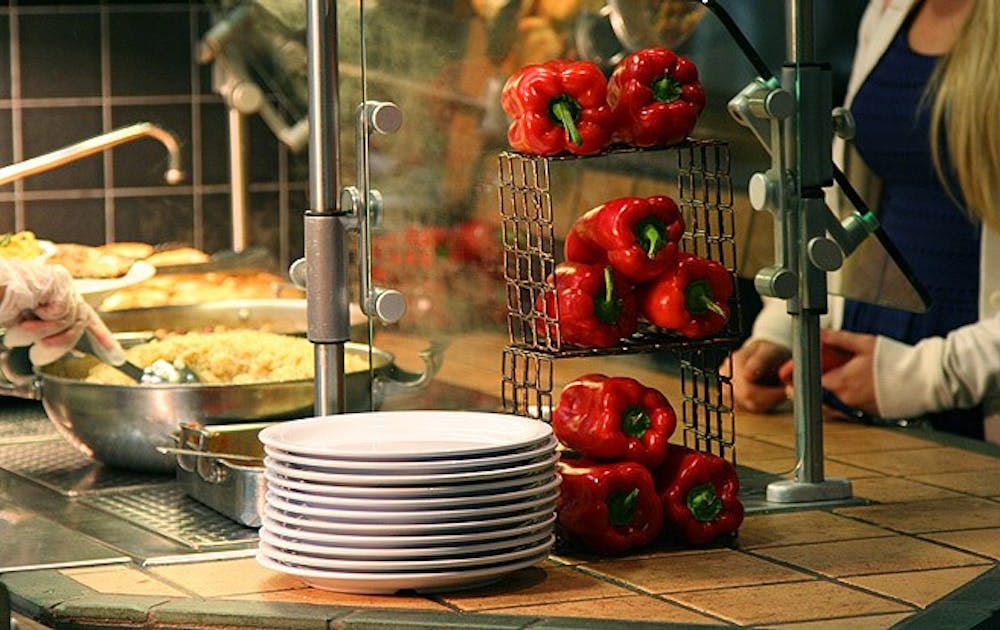Bon Appetit is keeping its student food options close to home.
Providing food in the Marketplace and Great Hall, Bon Appetit Management Company attempts to use local and sustainable produce in on-campus dining hall food. Some of that food comes from the Duke Campus Farm, which is located on a 12-acre plot near the Duke Forest and is operated by Duke students and alumni.
The Duke Campus Farm, founded in early spring 2011, has an agreement with Duke Dining that everything that is grown is provided to the Marketplace on East Campus and Great Hall on West Campus, Sloss said.
“We meet at the beginning of every semester to see what they need, what they want, what they don’t want us to grow again,” Campus Farm Manager Emily Sloss, Trinity ’10, said. “We work really closely with them to make sure that we meet their needs.”
Marketplace Manager Michael Brownlee said he enjoys wondering what produce the campus farm will provide every week and planning how to incorporate it into the weekly menu. Menus are created to be seasonal and based on what is available locally, rather than a fixed menu based on the day of the week, he noted.
“We’re not stuck with just spaghetti and meatballs every Wednesday,” Brownlee said.
Brownlee noted that although efforts are made to utilize what the Campus Farm provides, it is a small operation and cannot sustain the sheer volume of food that Bon Appetit prepares for students.
Brownlee cited beets as an example. The Marketplace will take all three bins of beets that the Campus Farm might be able to provide one week, but this is not enough to feed everyone who eats there.
The Campus Farm is one of 52 Farm to Fork Vendors, a term Bon Appetit coined to describe small sustainable farms that are within a 150-mile radius of the café, Brownlee added. Café Bon Appetit’s spends 23 percent of its budget on Farm to Fork produce while the rest of the food comes from large vendors such as US Foods.
“We certainly want to spend as much as we can with [the Farm to Fork] program but we also have to look at cost and what’s available,” Brownlee said.
He noted that while cream from Maple View farms—another local farm—is used, it cannot provide all of the butter that is needed on campus.
Showing and teaching people about the state of agriculture is difficult without a fully functioning farm, she noted.
“It’s easier to reach many more people by having the food in the campus dining halls because we reach the 4,000 people who eat in the dining hall every day,” Sloss said. “Our priority is education, especially at an institution of higher learning, but the production side of it is just as important.”
After delivery, Brownlee said that the food from the Campus Farm is put on display as decoration and then triple washed and used in food production the next day.
“I want people to see [Campus Farm food] and say ‘Wow, that’s really cool. Did it come from the farm?’” Brownlee added.
Even with Bon Appetit’s efforts to use sustainable ingredients, not all students are content with the current state of food on campus.
“It’s great what they do, but Bon Appetit is really the only dining service that has that commitment to local food,” said senior Hannah Colton, a member of the Real Food Campaign which aims to shift Duke’s food budget to sources that are ecologically sound, fair, community-based and humane.
Colton, a Chronicle columnist, added that Bon Appetit only provides 30 to 40 percent of the on-campus food leaving 60 to 70 percent, most of which does not have sustainability goals.
As part of the campaign’s Real Food Challenge, Colton noted that students are in the process of tracking where food purchases are made and what criteria— ecologically sound, fair, community-based and humane—they meet.
“We’re going to be starting with Bon Appetit, but eventually we’d like to move on to the independent vendors—although that will be more difficult,” Colton said. “We really want to be able to celebrate the eateries on campus that do a good job and also challenge the other eateries.”
The Real Food Campaign will be hosting Food Day Oct. 24, which will provide students with meals composed of local and sustainable food.
Get The Chronicle straight to your inbox
Signup for our weekly newsletter. Cancel at any time.

